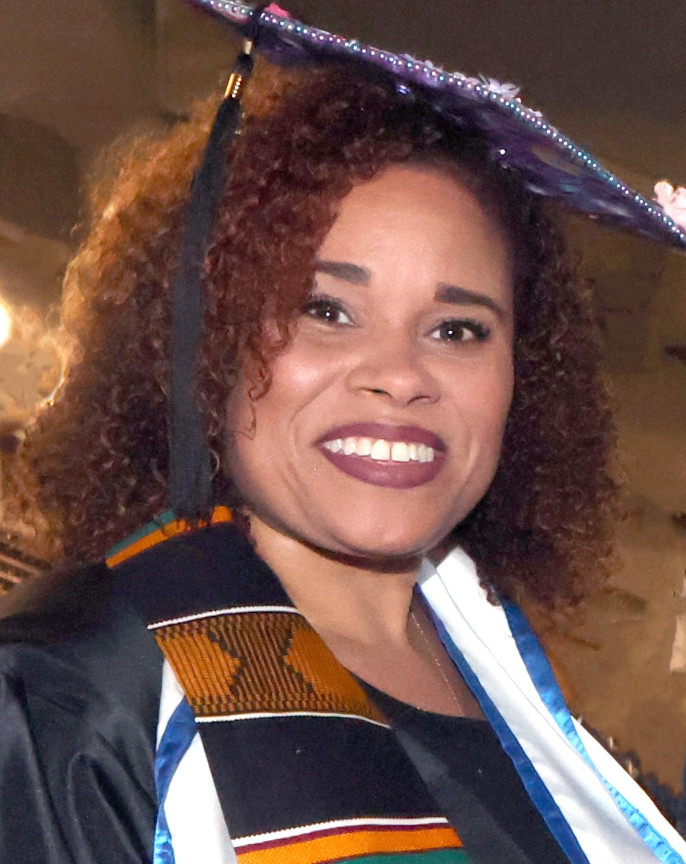
Malika Bratton was awarded the 2022/2023 Outstanding Graduate Teaching Associate for the communication studies department. She teaches courses in the communications department as an associated faculty at California State University San Bernardino. After transferring from Riverside City College, she received her bachelor's degree in liberal studies from California Baptist University and a Master of Arts degree in communication studies at California State University San Bernardino.
Malika's scholarship focuses on ways systemic oppression can create silence within hierarchical structure and is determined to give voice to those who are negatively impacted. Her thesis is titled “Black Women Professionals Charged with Diversity, Equity, and Inclusion Work: Use Silening^Voice to Resist and Navigate Embedded Structures of Whiteness in Hierarchical Academia.” Utilizing decolonial and qualitative methods with organizing silence and intersectionality theory that aid to disclose dimension of silence imposed on Women of Color. This study recenters WOC specifically Black Women voices by critically exploring strategies utilizing silence and voice to navigate hierarchical power dynamics. Her research continues as she collaborates with a CSUSB alumni in qualitative study that will be presented in November 2023, at the 109th Annual National Communication Association Convention title “Mood Management During Covid 19: How Families Coped Using Social Media.” This study will investigate how quarantined Black, Indigenous, People of Color and same-sex families connect with peers utilizing social media platforms during the pandemic utilizing mood management theory.
In November 2022, she presented two papers at the 108th Annual National Communication Association Convention. The first paper is titled “Black Women Struggles in Academia: Their Lived Experiences with Intersectionality of Gender, Race, and Silencing in Academia.” This project examines the intersectionality of gender, race, and class, and how Black women are silenced in the academy. In this project, organizational silence theory, racial foundation organizational communication theory, and intersectionality are used to uncover marginalized voices and how Black Women are silenced. The second paper “The Role of Gender and Race: Using Professional Titles During Leadership Council Meetings.” This project is an ethnographic study that examines gender and race and how individuals address one another's professional titles during leadership council meetings in academia. This project used organizational silence theory and organizational culture as a theoretical lens to uncover when silencing occurs for marginalized professionals. In May 2022, Malika was a Co-Discussant during a panel that focused on Black Women and aimed to mitigate gaps by exploring intersectionality as it applied to media at the 72 Annual International Communication Association Conference. She has also presented her research during CSUSB's Meeting of the Mind in April 2022 and April 2023.
Malika strives to create an environment that shows her commitment to expanding on developing and advancing equitable practices for colleagues and students. Her mission is to aid her students with achieving their academic goals. She achieves this by creating a culturally relevant community of advancing equity through fostering learning opportunities, teaching practices, and scholarship. She continues her growth and experience with teaching and scholarship as a Co-Chair of the Student Equity college committee at Riverside City College, where she has worked as a classified professional for 22 years.
In recognition of her leadership skills in addressing inequities in the classroom, Malika was selected as a Region 9 Faculty Fellow. Region 9 is a mentorship program led by faculty.
Furthermore, she volunteers with the Adriene Dell and Carmen Roberts Foundation, which promotes cultural interaction within the community. Malika demonstrates her mission to build relationships and outreach by fostering equitable practices along with creating a culturally competent classroom and working environment.
Malika believes that change is made by communicating effectively and purposefully to understand the communication barriers between various groups of people. She seeks to erase the blurred lines of communication and reconnect the lines of understanding to promote learning and teachable moments that bring about systemic change.